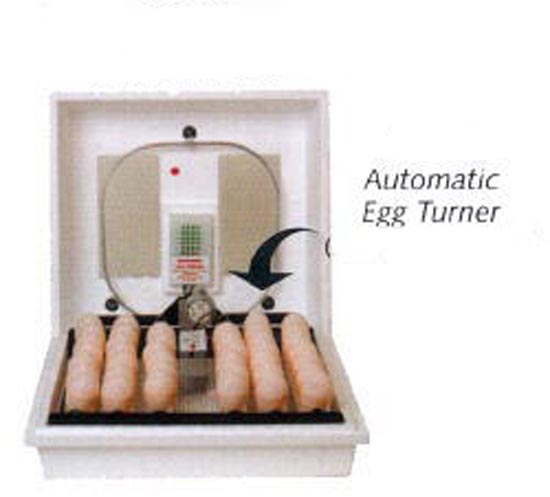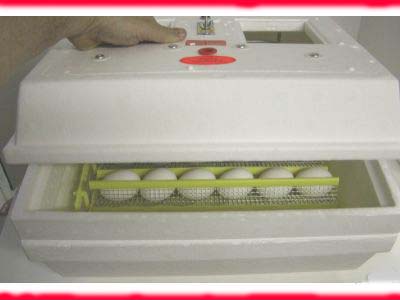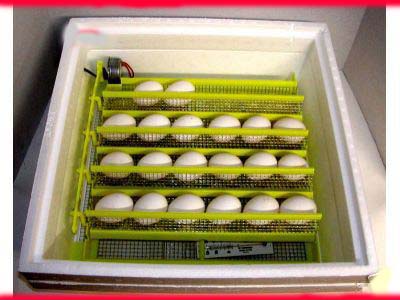 NELSON MORAES NELSON MORAES 
|
Email
moraesnl@hotmail.com
259 W. 3rd. st.
Moorestown, NJ - 08057
USA












 EGG INCUBATORS
EGG TURNER - ACCESSORIES
Click on images below to enlarge and more info.
A MODEL
EGG INCUBATORS
EGG TURNER - ACCESSORIES
Click on images below to enlarge and more info.
A MODEL
 STILL AIR EGG IINCUBATOR and EGG TURNER
$ 145.00
Features a solid state circuitry for the most reliable
temperature control available. Thermometer included, 42
chicken egg capacity, housing made of recyclable and
flame retardant polystryne foam.
B MODEL
STILL AIR EGG IINCUBATOR and EGG TURNER
$ 145.00
Features a solid state circuitry for the most reliable
temperature control available. Thermometer included, 42
chicken egg capacity, housing made of recyclable and
flame retardant polystryne foam.
B MODEL

 CIRCULATED AIR EGG INCUBATOR WITH FAN AND EGG TURNER
FOR 42 CHICKEN EGGS OR 120 QUAIL EGGS CAPACITY
$ 175.00
Is the most economical, reliable incubator available.
The radiant heat tube gently warms the inside of the
incubator, the air and eggs. Thermal action of the
heated air flowing out the exhaust vents in the top
of the incubator, draws fresh air in through the
bottom vent. This thermal air flow also assists the
drying of the chicks after they hatch. The FAN
CIRCULATED AIR FLOW incubator is designed to hold a
more uniform temperature.
All incubators include a sanitary plastic liner.
Dimensions: 18" x 18" x 9 1 /2",
110 Volt AC. 25 Watt Heat Element.
C MODEL
CIRCULATED AIR EGG INCUBATOR WITH FAN AND EGG TURNER
FOR 42 CHICKEN EGGS OR 120 QUAIL EGGS CAPACITY
$ 175.00
Is the most economical, reliable incubator available.
The radiant heat tube gently warms the inside of the
incubator, the air and eggs. Thermal action of the
heated air flowing out the exhaust vents in the top
of the incubator, draws fresh air in through the
bottom vent. This thermal air flow also assists the
drying of the chicks after they hatch. The FAN
CIRCULATED AIR FLOW incubator is designed to hold a
more uniform temperature.
All incubators include a sanitary plastic liner.
Dimensions: 18" x 18" x 9 1 /2",
110 Volt AC. 25 Watt Heat Element.
C MODEL
 PRE-SET EGG INCUBATOR
$ 250.00
Simply plug it in, then add water and eggs.
NOTHING ELSE TO SET UP OR ADJUST.
It has a pre-set Thermostat; 110 volt. AC. 25 Watt
Dimensions: 18'' (45cm) x 18'' (45cm) x 9-1/4'' (19cm).
This circulated air incubator comes with a thermometer,
plastic bottom liner and regulates itself in the 99.5
degree F (37.5 C) range, with built in sensors that
prevent the "burn up" of eggs. Like all incubators, this
egg incubator requires a stable room temperature and
should not be used in areas like sheds or barns.
D MODEL
PRE-SET EGG INCUBATOR
$ 250.00
Simply plug it in, then add water and eggs.
NOTHING ELSE TO SET UP OR ADJUST.
It has a pre-set Thermostat; 110 volt. AC. 25 Watt
Dimensions: 18'' (45cm) x 18'' (45cm) x 9-1/4'' (19cm).
This circulated air incubator comes with a thermometer,
plastic bottom liner and regulates itself in the 99.5
degree F (37.5 C) range, with built in sensors that
prevent the "burn up" of eggs. Like all incubators, this
egg incubator requires a stable room temperature and
should not be used in areas like sheds or barns.
D MODEL

 GOOSE INCUBATOR WITH FAN & EGG TURNER
$ 250.00
Circulated Air Incubator for hatching goose eggs.
- During incubation, eggs must be turned several
times a day to prevent the yolk from settling to
one side and to exercise the embryo.
- Turning the eggs by hand is the most demanding
and time consuming part of egg incubation. Speci-
fication: Turner holds a total of 4 Racks, each
rack holds 3 to 4 Goose Eggs.
E MODEL
GOOSE INCUBATOR WITH FAN & EGG TURNER
$ 250.00
Circulated Air Incubator for hatching goose eggs.
- During incubation, eggs must be turned several
times a day to prevent the yolk from settling to
one side and to exercise the embryo.
- Turning the eggs by hand is the most demanding
and time consuming part of egg incubation. Speci-
fication: Turner holds a total of 4 Racks, each
rack holds 3 to 4 Goose Eggs.
E MODEL
 EGG INCUBATOR FOR 89 CHICHEN EGGS CAPACITY
$ 740,00
This incubator has an egg turning, regulation of humidity and
the electronic control of temperature. Instruction manual is
included and it is very simple to operate. Features include:
a solid state temperature control, thermal backup wafer,
mercury wet and dry bulb thermometers, automatic egg turning
and outside water bottle. The incubator comes with one grid
for 89 average size chickens eggs or the grid of your choice.
F MODEL
EGG INCUBATOR FOR 89 CHICHEN EGGS CAPACITY
$ 740,00
This incubator has an egg turning, regulation of humidity and
the electronic control of temperature. Instruction manual is
included and it is very simple to operate. Features include:
a solid state temperature control, thermal backup wafer,
mercury wet and dry bulb thermometers, automatic egg turning
and outside water bottle. The incubator comes with one grid
for 89 average size chickens eggs or the grid of your choice.
F MODEL
 REPTILE INCUBATOR
$ 750.00
Weight 60 Lb
Dimensions: 19"L x 21"W x 19 1/2"H (Including Air Vents)
This reptile incubator was designed and manufactured
with the serious herpetologist in mind.
The incubator is controlled with a highly accurate
solid state ten-turn temperature control. This unit
also includes secondary thermal wafer thermostat as
a back-up over temperature protection device. This
system features fan forced air circulation utilizing
a computer quality muffin fan to create unique wall
of air on all four sides of the unit. An adjustable
air intake system provides superior gas exchange
between the inside and the outside of the incubation
chamber. The construction assures good visibility
of developing eggs. This bator, as well as our other
herpetological and bird incubators, are built with
time tested, proven components and engineering which
help to achieve and maintain a stable incubation
environment eliminating the risk of outside drafts.
Capacity: 40 to 45 python eggs, or equivalent for
other species, depending on size of eggs;
Four plastic boxes and enough vermiculite to be
used as a medium; Highly Accurate Solid State
Temperature Control; Easy Access Sliding
Incubation Trays; Fan Forced Air Circulation
Adjustable Air Intake System; Backup Thermal
afer Temperature Control.
* FOR ACESSORIES *
Click Here
REPTILE INCUBATOR
$ 750.00
Weight 60 Lb
Dimensions: 19"L x 21"W x 19 1/2"H (Including Air Vents)
This reptile incubator was designed and manufactured
with the serious herpetologist in mind.
The incubator is controlled with a highly accurate
solid state ten-turn temperature control. This unit
also includes secondary thermal wafer thermostat as
a back-up over temperature protection device. This
system features fan forced air circulation utilizing
a computer quality muffin fan to create unique wall
of air on all four sides of the unit. An adjustable
air intake system provides superior gas exchange
between the inside and the outside of the incubation
chamber. The construction assures good visibility
of developing eggs. This bator, as well as our other
herpetological and bird incubators, are built with
time tested, proven components and engineering which
help to achieve and maintain a stable incubation
environment eliminating the risk of outside drafts.
Capacity: 40 to 45 python eggs, or equivalent for
other species, depending on size of eggs;
Four plastic boxes and enough vermiculite to be
used as a medium; Highly Accurate Solid State
Temperature Control; Easy Access Sliding
Incubation Trays; Fan Forced Air Circulation
Adjustable Air Intake System; Backup Thermal
afer Temperature Control.
* FOR ACESSORIES *
Click Here


 Never expect more than 80% percent success in hatching eggs in these or any
other egg incubators. Commercial hatcheries with their highly specialized
equipment do not average more than an 80 percent hatch of all the eggs they
incubate.
Formation of the Egg
The avian egg is very complex. The development of the embryo takes place in
the blastoderm. The albumen envolves the yolk and protects the embryo life.
It is shock-absorbing with a water content and elastic.
The yolk and albumen protects the life of a embryo during three weeks.
This system has two membranes and the shell. The shell conserves the food
and water supply within, also provides an exchange of gases.
Incubation
Keep the egg incubator in a room where the temperature is between 70F and
75F. Do not place the incubator near windows, avoid the direct rays of the
sun or near cold walls.
Wash and disinfect the incubator before each use.
Start the incubator a day before setting the eggs. Turn on the heat and
place water in the tray, by doing you will get better incubation results.
Put a thermometer in the incubator, the bulb suppose to be one inch above
the screen floor, close the incubator. Adjust the thermostat until
the temperature stays between 101o and 102oF. Do not let the he bulb touches
the eggs or the thermometer or the side of the incubator. Make sure the sides
and top of the incubator should fit properly to prevent heat loss.
There are two types of incubatorse: forced-air and still-air
incubators. In forced-air incubators, the fan provides internal circulation
of the air. The still-air incubators have no fans for air circulation.
Air exchange is made by escaping warm, stale air at the top and entering
cooler, fresh air at the bottom. Recommended temperatures are different
between the two incubators, the the still-air incubator works on 2 degrades
higher than a circulated air incubator, so follow the manufacturer's
recommendations.
In order to get hight hatch, the temperature suppose to be close to 102F.
during incubation period. A minor fluctuations of 1F. above and below the
desired temperature is ok, but there should not be kept for long periods.
Hatching eggs can take an amazing amount of abuse because they are
well protected and insulated, but they are sensitive to extreme heat.
Operating the incubator at 105F. for 30 minutes will harm many
embryos, but operating at 90F. for three to four hours will merely
slow the rate of growth. Maintain a forced-air incubator at 100oF.
for best results.
Humidity must be carefully controlled to prevent unnecessary moisture
loss from the eggs. A device often used to measure humidity inside
an incubator is the hygrometer. Readings from a hygrometer are measured
in "degrees, wet bulb." Use the table to convert hygrometer readings
to relative humidity. The relative humidity in the incubator for the
first 18 days should remain at 58-60 percent or 87-89F., wet bulb.
Increase the humidity during the last three days of incubation to at
least 65 percent relative humidity or 90-94F., wet bulb.
Check the thermometer! Is it accurate? An error of one degree for
21 days can seriously interfere with an embryo's growth. To check
the incubator thermometer, place the bulb next to the bulb of a
clinical (oral kind used to check body temperature) or a laboratory
thermometer. Hold them under lukewarm water and compare the readings.
Both should read the same temperature, so make adjustments for any
error in the incubator thermometer.
Never expect more than 80% percent success in hatching eggs in these or any
other egg incubators. Commercial hatcheries with their highly specialized
equipment do not average more than an 80 percent hatch of all the eggs they
incubate.
Formation of the Egg
The avian egg is very complex. The development of the embryo takes place in
the blastoderm. The albumen envolves the yolk and protects the embryo life.
It is shock-absorbing with a water content and elastic.
The yolk and albumen protects the life of a embryo during three weeks.
This system has two membranes and the shell. The shell conserves the food
and water supply within, also provides an exchange of gases.
Incubation
Keep the egg incubator in a room where the temperature is between 70F and
75F. Do not place the incubator near windows, avoid the direct rays of the
sun or near cold walls.
Wash and disinfect the incubator before each use.
Start the incubator a day before setting the eggs. Turn on the heat and
place water in the tray, by doing you will get better incubation results.
Put a thermometer in the incubator, the bulb suppose to be one inch above
the screen floor, close the incubator. Adjust the thermostat until
the temperature stays between 101o and 102oF. Do not let the he bulb touches
the eggs or the thermometer or the side of the incubator. Make sure the sides
and top of the incubator should fit properly to prevent heat loss.
There are two types of incubatorse: forced-air and still-air
incubators. In forced-air incubators, the fan provides internal circulation
of the air. The still-air incubators have no fans for air circulation.
Air exchange is made by escaping warm, stale air at the top and entering
cooler, fresh air at the bottom. Recommended temperatures are different
between the two incubators, the the still-air incubator works on 2 degrades
higher than a circulated air incubator, so follow the manufacturer's
recommendations.
In order to get hight hatch, the temperature suppose to be close to 102F.
during incubation period. A minor fluctuations of 1F. above and below the
desired temperature is ok, but there should not be kept for long periods.
Hatching eggs can take an amazing amount of abuse because they are
well protected and insulated, but they are sensitive to extreme heat.
Operating the incubator at 105F. for 30 minutes will harm many
embryos, but operating at 90F. for three to four hours will merely
slow the rate of growth. Maintain a forced-air incubator at 100oF.
for best results.
Humidity must be carefully controlled to prevent unnecessary moisture
loss from the eggs. A device often used to measure humidity inside
an incubator is the hygrometer. Readings from a hygrometer are measured
in "degrees, wet bulb." Use the table to convert hygrometer readings
to relative humidity. The relative humidity in the incubator for the
first 18 days should remain at 58-60 percent or 87-89F., wet bulb.
Increase the humidity during the last three days of incubation to at
least 65 percent relative humidity or 90-94F., wet bulb.
Check the thermometer! Is it accurate? An error of one degree for
21 days can seriously interfere with an embryo's growth. To check
the incubator thermometer, place the bulb next to the bulb of a
clinical (oral kind used to check body temperature) or a laboratory
thermometer. Hold them under lukewarm water and compare the readings.
Both should read the same temperature, so make adjustments for any
error in the incubator thermometer.




 NELSON MORAES
NELSON MORAES 
 EGG INCUBATORS
EGG TURNER - ACCESSORIES
Click on images below to enlarge and more info.
A MODEL
EGG INCUBATORS
EGG TURNER - ACCESSORIES
Click on images below to enlarge and more info.
A MODEL
 STILL AIR EGG IINCUBATOR and EGG TURNER
$ 145.00
Features a solid state circuitry for the most reliable
temperature control available. Thermometer included, 42
chicken egg capacity, housing made of recyclable and
flame retardant polystryne foam.
B MODEL
STILL AIR EGG IINCUBATOR and EGG TURNER
$ 145.00
Features a solid state circuitry for the most reliable
temperature control available. Thermometer included, 42
chicken egg capacity, housing made of recyclable and
flame retardant polystryne foam.
B MODEL

 CIRCULATED AIR EGG INCUBATOR WITH FAN AND EGG TURNER
FOR 42 CHICKEN EGGS OR 120 QUAIL EGGS CAPACITY
$ 175.00
Is the most economical, reliable incubator available.
The radiant heat tube gently warms the inside of the
incubator, the air and eggs. Thermal action of the
heated air flowing out the exhaust vents in the top
of the incubator, draws fresh air in through the
bottom vent. This thermal air flow also assists the
drying of the chicks after they hatch. The FAN
CIRCULATED AIR FLOW incubator is designed to hold a
more uniform temperature.
All incubators include a sanitary plastic liner.
Dimensions: 18" x 18" x 9 1 /2",
110 Volt AC. 25 Watt Heat Element.
C MODEL
CIRCULATED AIR EGG INCUBATOR WITH FAN AND EGG TURNER
FOR 42 CHICKEN EGGS OR 120 QUAIL EGGS CAPACITY
$ 175.00
Is the most economical, reliable incubator available.
The radiant heat tube gently warms the inside of the
incubator, the air and eggs. Thermal action of the
heated air flowing out the exhaust vents in the top
of the incubator, draws fresh air in through the
bottom vent. This thermal air flow also assists the
drying of the chicks after they hatch. The FAN
CIRCULATED AIR FLOW incubator is designed to hold a
more uniform temperature.
All incubators include a sanitary plastic liner.
Dimensions: 18" x 18" x 9 1 /2",
110 Volt AC. 25 Watt Heat Element.
C MODEL
 PRE-SET EGG INCUBATOR
$ 250.00
Simply plug it in, then add water and eggs.
NOTHING ELSE TO SET UP OR ADJUST.
It has a pre-set Thermostat; 110 volt. AC. 25 Watt
Dimensions: 18'' (45cm) x 18'' (45cm) x 9-1/4'' (19cm).
This circulated air incubator comes with a thermometer,
plastic bottom liner and regulates itself in the 99.5
degree F (37.5 C) range, with built in sensors that
prevent the "burn up" of eggs. Like all incubators, this
egg incubator requires a stable room temperature and
should not be used in areas like sheds or barns.
D MODEL
PRE-SET EGG INCUBATOR
$ 250.00
Simply plug it in, then add water and eggs.
NOTHING ELSE TO SET UP OR ADJUST.
It has a pre-set Thermostat; 110 volt. AC. 25 Watt
Dimensions: 18'' (45cm) x 18'' (45cm) x 9-1/4'' (19cm).
This circulated air incubator comes with a thermometer,
plastic bottom liner and regulates itself in the 99.5
degree F (37.5 C) range, with built in sensors that
prevent the "burn up" of eggs. Like all incubators, this
egg incubator requires a stable room temperature and
should not be used in areas like sheds or barns.
D MODEL

 GOOSE INCUBATOR WITH FAN & EGG TURNER
$ 250.00
Circulated Air Incubator for hatching goose eggs.
- During incubation, eggs must be turned several
times a day to prevent the yolk from settling to
one side and to exercise the embryo.
- Turning the eggs by hand is the most demanding
and time consuming part of egg incubation. Speci-
fication: Turner holds a total of 4 Racks, each
rack holds 3 to 4 Goose Eggs.
E MODEL
GOOSE INCUBATOR WITH FAN & EGG TURNER
$ 250.00
Circulated Air Incubator for hatching goose eggs.
- During incubation, eggs must be turned several
times a day to prevent the yolk from settling to
one side and to exercise the embryo.
- Turning the eggs by hand is the most demanding
and time consuming part of egg incubation. Speci-
fication: Turner holds a total of 4 Racks, each
rack holds 3 to 4 Goose Eggs.
E MODEL
 EGG INCUBATOR FOR 89 CHICHEN EGGS CAPACITY
$ 740,00
This incubator has an egg turning, regulation of humidity and
the electronic control of temperature. Instruction manual is
included and it is very simple to operate. Features include:
a solid state temperature control, thermal backup wafer,
mercury wet and dry bulb thermometers, automatic egg turning
and outside water bottle. The incubator comes with one grid
for 89 average size chickens eggs or the grid of your choice.
F MODEL
EGG INCUBATOR FOR 89 CHICHEN EGGS CAPACITY
$ 740,00
This incubator has an egg turning, regulation of humidity and
the electronic control of temperature. Instruction manual is
included and it is very simple to operate. Features include:
a solid state temperature control, thermal backup wafer,
mercury wet and dry bulb thermometers, automatic egg turning
and outside water bottle. The incubator comes with one grid
for 89 average size chickens eggs or the grid of your choice.
F MODEL
 REPTILE INCUBATOR
$ 750.00
Weight 60 Lb
Dimensions: 19"L x 21"W x 19 1/2"H (Including Air Vents)
This reptile incubator was designed and manufactured
with the serious herpetologist in mind.
The incubator is controlled with a highly accurate
solid state ten-turn temperature control. This unit
also includes secondary thermal wafer thermostat as
a back-up over temperature protection device. This
system features fan forced air circulation utilizing
a computer quality muffin fan to create unique wall
of air on all four sides of the unit. An adjustable
air intake system provides superior gas exchange
between the inside and the outside of the incubation
chamber. The construction assures good visibility
of developing eggs. This bator, as well as our other
herpetological and bird incubators, are built with
time tested, proven components and engineering which
help to achieve and maintain a stable incubation
environment eliminating the risk of outside drafts.
Capacity: 40 to 45 python eggs, or equivalent for
other species, depending on size of eggs;
Four plastic boxes and enough vermiculite to be
used as a medium; Highly Accurate Solid State
Temperature Control; Easy Access Sliding
Incubation Trays; Fan Forced Air Circulation
Adjustable Air Intake System; Backup Thermal
afer Temperature Control.
* FOR ACESSORIES *
Click Here
REPTILE INCUBATOR
$ 750.00
Weight 60 Lb
Dimensions: 19"L x 21"W x 19 1/2"H (Including Air Vents)
This reptile incubator was designed and manufactured
with the serious herpetologist in mind.
The incubator is controlled with a highly accurate
solid state ten-turn temperature control. This unit
also includes secondary thermal wafer thermostat as
a back-up over temperature protection device. This
system features fan forced air circulation utilizing
a computer quality muffin fan to create unique wall
of air on all four sides of the unit. An adjustable
air intake system provides superior gas exchange
between the inside and the outside of the incubation
chamber. The construction assures good visibility
of developing eggs. This bator, as well as our other
herpetological and bird incubators, are built with
time tested, proven components and engineering which
help to achieve and maintain a stable incubation
environment eliminating the risk of outside drafts.
Capacity: 40 to 45 python eggs, or equivalent for
other species, depending on size of eggs;
Four plastic boxes and enough vermiculite to be
used as a medium; Highly Accurate Solid State
Temperature Control; Easy Access Sliding
Incubation Trays; Fan Forced Air Circulation
Adjustable Air Intake System; Backup Thermal
afer Temperature Control.
* FOR ACESSORIES *
Click Here




